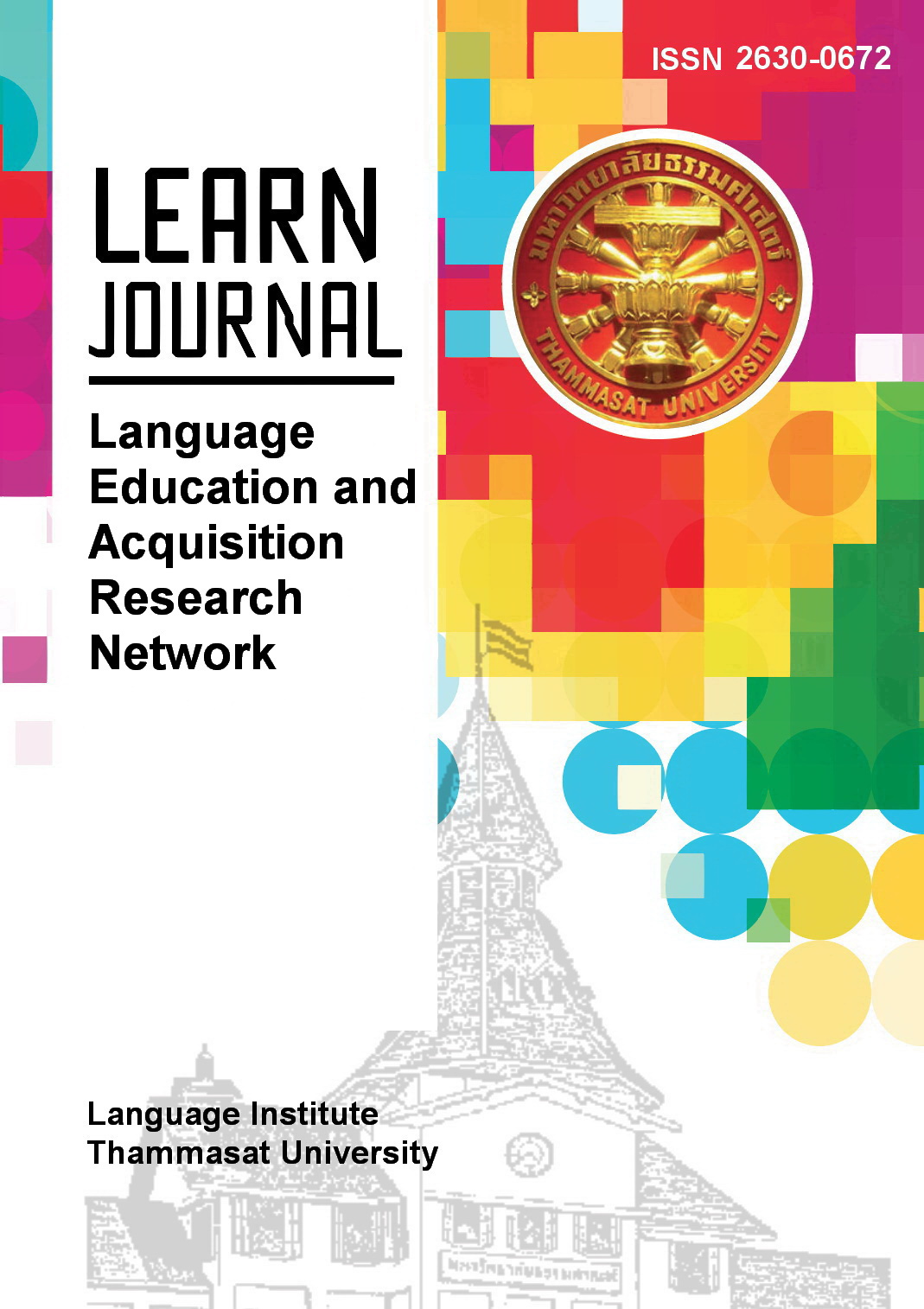English Language Skills Required by International Relations Officers: A Target Situation Analysis and Its Implications for English for International Relations Officers Course Design
Main Article Content
Abstract
To develop an English for Specific Purposes (ESP) course for learners who would like to work as international relations officers (IROs), a Target Situation Analysis (TSA) is obligatory for course developers to arrive at a conclusion regarding the English language skills that learners have to master in order to work in this professional context successfully. The present study, therefore, aims to investigate which English language skills are required for working as an IRO. Overall, 400 Thai IROs were purposively selected to participate in the study. The data collection procedures were divided into the collection of quantitative data through a questionnaire and qualitative data through semi-structured interviews. The findings revealed that listening and reading skills were most required by IROs in various working contexts. These two receptive skills are generally utilized because IROs need to gather information to build knowledge for communicating with their foreign counterparts. However, speaking and writing skills are still widely applied by IROs, as they also need to deliver key messages precisely and appropriately. The results of this study offer ESP course developers valuable insights into the English skills that should be emphasized in ESP courses for IROs.
Article Details
References
Akyel, A. S., & Ozek, Y. (2010). A language needs analysis research at an English medium university in Turkey. Procedia - Social and Behavioral Sciences, 2(2), 969-975.
Aliakbari, M., & Boghayeri, M. (2014). A needs analysis approach to ESP design in Iranian context. Procedia - Social and Behavioral Science, 98, 175-181.
Alsamadani, H. A. (2017). Needs analysis in ESP context: Saudi engineering students as a case study. Advances in Language and Literacy Studies, 8(6), 58-68.
Basturkmen, H. (2010). Developing courses in English for Specific Purposes. Palgrave Macmillan.
Bielousova, R. (2017). Developing materials for English for Specific Purposes online course within the blended learning concept. TEM Journal, 6(3), 637-642.
Brown, J. D. (1995). The elements of language curriculum: A systematic approach to program development. Heinle & Heinle.
Chostelidou, D. (2011). Needs-based course design: The impact of general English knowledge on the effectiveness of an ESP teaching intervention. Procedia – Social and Behavioral Sciences, 15, 403-409.
Cowling, J.D. (2007). Needs analysis: Planning a syllabus for a series of intensive workplace courses at a leading Japanese company. English for Specific Purposes, 26, 426-442.
Crystal, D. (2003). English as a global language (2nd ed.). Cambridge University Press.
Dossan, Z. (2020). English as a language of diplomacy. Journal of Literature, Languages and Linguistics, 73, 16-24.
Dudley-Evans, T., & St. John, M. J. (1998). Developments in English for Specific Purposes: A multi-disciplinary approach. Cambridge University Press.
Gjata, F. (2017). The importance of English in the development of international relations and diplomacy. Anglisticum Journal, 6(11), 56-60.
Hyland, K. (2006). English for specific purposes. Routledge.
Hutchinson, T., & Waters, A. (1987). English for specific purposes: A learning-centred approach. Cambridge University Press.
Ibrahim, H. H. (2020) Needs analysis as a prerequisite for designing an ESP course for medical students. Open Journal of Modern Linguistics, 10, 83-103.
Jordan, R. (2010). English for academic purposes. Cambridge University
Press.
Kirkpatrick, A., Subhan, S., & Walkinshaw, I. (2019). English as a lingua franca in East and Southeast Asia: Implications for Diplomatic and Intercultural Communication. In P. Friedrich (Ed.), English for Diplomatic Purposes (pp. 75-93). Multilingual Matters.
Liu, J.Y., Chang, Y. J., Yang, F.Y., Sun, Y.C., (2011). Is what I need what I want? Reconceptualizing college students’ needs in English courses for general and specific/academic purposes. Journal of English for Academic Purposes. 10(4), 271-280.
Long, M. H. (2005). Second language needs analysis. Cambridge University Press.
McCawley, P. (2009). Methods for conducting an educational needs assessment: Guidelines for cooperative extension system professionals. University of Idaho Extension.
Nation, I. S. P., & Macalister, J. (2010). Language curriculum design. Routledge.
Otilia, S. M., (2015). Needs analysis in English for specific purposes. Annals – Economy Series, Constantin Brancusi University, Faculty of Economics, 1, 54-55.
Poorhadi, M. (2017). Designing an ESP course for Iranian students of architecture: A skill-based approach. Journal of Applied Linguistics and Language Research, 4(5), 20-47.
Robinson, P. C. (1991). ESP today: A practitioner’s guide. Prentice-Hall International.
Salazar, E. U. (2017). Designing and implementing an ESP course: Revisiting an experience. Revisita Pensamiento Actual, 17(28), 197-207.
Saputro, T. H., & Hima, A. N. (2018). Exploring the English needs of students of international relations department at an Indonesian university context. English Education: Jurnal Tadris Bahasa Inggris, 11(1), 1-21.
Sari, L. L. & Sari, R. H. (2020). Exploring English language needs of Indonesian marine pilots: A need analysis and its implications in ESP classrooms. The International Journal on Marine Navigation and Safety of Sea Transportation, 14(4), 909-917.
Vaghari, S., & Shuib, M. (2013). A target needs analysis of the written communication skills for students of writing for professional purposes course. Jurnal Teknologi (Social Science), 65(2), 115-123.
Walkinshaw, I., Mitchell, N., & Subhan, S. (2019). Self-denigration as a relational strategy in lingua franca talk: Asian English speakers. Journal of Pragmatics, 139, 40-51.
West, R. (1994). Needs analysis in language teaching. Language Teaching, 27(1), 1-19.


